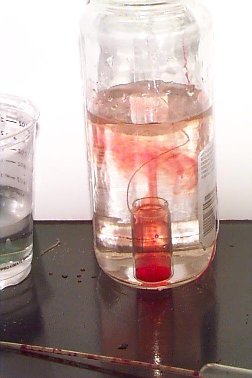
When a fluid (a gas or a liquid) is different temperatures in different
places, it can come into equilibrium by mixing. This process is called
convection. The mixing can take place because something is stirring
the fluid (like a fan), but sometimes the temperature difference itself
will make the liquid move. The first case is called forced convection
and the second is natural convection.

In the picture at right, the small glass vial contains warm water that has been colored red; it is at the bottom of a larger container of cool, clear water. Set this up yourself. The tricky part is getting the vial into the large container without losing its contents or greatly disturbing the water in the large container. Also set up the contrasting situation, where the vial contains cold colored water and the container is filled with warm water.
Another experiment you can try is to use the pipette to inject a blob of warm or cool water (colored, of course) someplace in a container of water.
 How does a temperature
difference affect a container of water?
How does a temperature
difference affect a container of water?

The "lava lamp" uses the convection effect to make blobs of different fluids
move around. You can surely find other examples of convection being used in every day life.
Check the box when you are done:
Next activity:
Convecting energy upwards and downwards